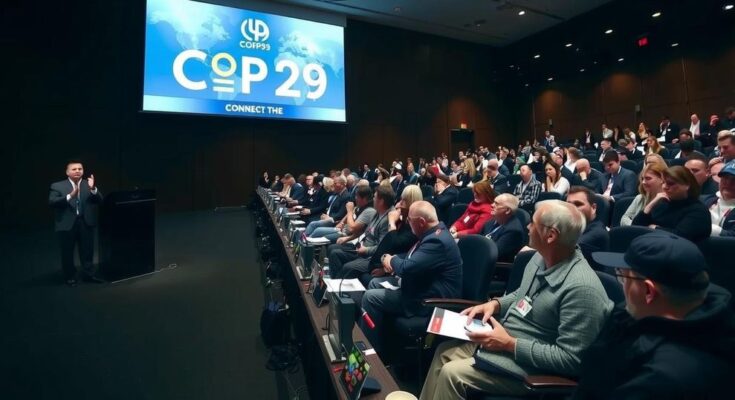COP29 concluded with the approval of a new climate finance goal of $300 billion, which has been widely criticized as inadequate compared to the estimated $1.3 trillion needed for developing countries. This outcome has drawn significant backlash from numerous organizations, who emphasized the failure of developed nations to meet their commitments and the risks posed to vulnerable populations in the Global South.
The recent COP29 concluded with significant dismay as the new climate finance goal (NCQG) was solidified with little opportunity for discussion. Unlike the anticipated $1.3 trillion required, the final agreement fell drastically short at $300 billion, invoking criticism from various organizations and leaders present. This lack of sufficient financial assistance jeopardizes the credibility of international climate commitments and risks the welfare of vulnerable populations in the Global South, intensifying an already pressing climate crisis.
Amidst growing dissent, representatives from several organizations expressed their disappointment. Catherine Pettengell of Climate Action Network UK labeled the outcome a “bad deal,” criticizing the absence of substantial financial commitments which she argued impose an unjust burden on those least responsible for climate change. Liz Cronin from CAFOD lamented that the anticipated progress was hindered by persistent tensions between developed and developing countries, urging immediate national climate plans to stay within critical climate targets.
Ben Wilson, Director at SCIAF, observed that the proceedings showcased a stark lack of preparedness among developed nations, significantly undermining global trust in climate initiatives. Addressing this void, Zahra Hdidou from ActionAid UK emphasized the insufficiency of the financial pledge regarding the dire needs of climate-affected communities, particularly women and girls. Individuals on the ground, such as youth representatives from regions like South Sudan, voiced their frustrations, calling for a more robust commitment to secure their futures amidst unfolding climate adversity.
Prominent figures concluded that the actions taken at COP29 reflect a grievous moral failing, illustrating a profound disconnect from the urgent needs of the most affected populations. Advocacy groups demanded a revision of the agreements moving forward to address these shortcomings and reaffirmed their commitment to achieve equitable solutions. The outcome of COP29 thus provides a dire call to action for future climate negotiations, emphasizing the necessity for enhanced accountability and support for the Global South as they combat an escalating climate crisis.
The 29th Conference of the Parties (COP29) was a pivotal international summit aimed at addressing climate finance, particularly the commitments made by wealthier nations to support developing countries in their climate resilience efforts. The negotiations aimed to establish a new collective quantified goal (NCQG) for climate financing, with large sums deemed necessary to combat ongoing climate impacts. However, the final agreement fell considerably short of expert expectations and the needs articulated by vulnerable nations, leading to widespread disappointment among various stakeholders that represent the Global South.
In summary, COP29 has regrettably failed to meet the pressing climate financing needs that are critical for combating climate change, particularly for nations in the Global South. The outcome has triggered condemnations from global leaders and organizations who demand more substantial commitments from wealthy countries in future climate negotiations. The potential implications are profound, threatening the efficacy of climate action globally and underscoring the urgent need for reform in how developed nations engage with the climate crisis on an international scale.
Original Source: www.thecanary.co




